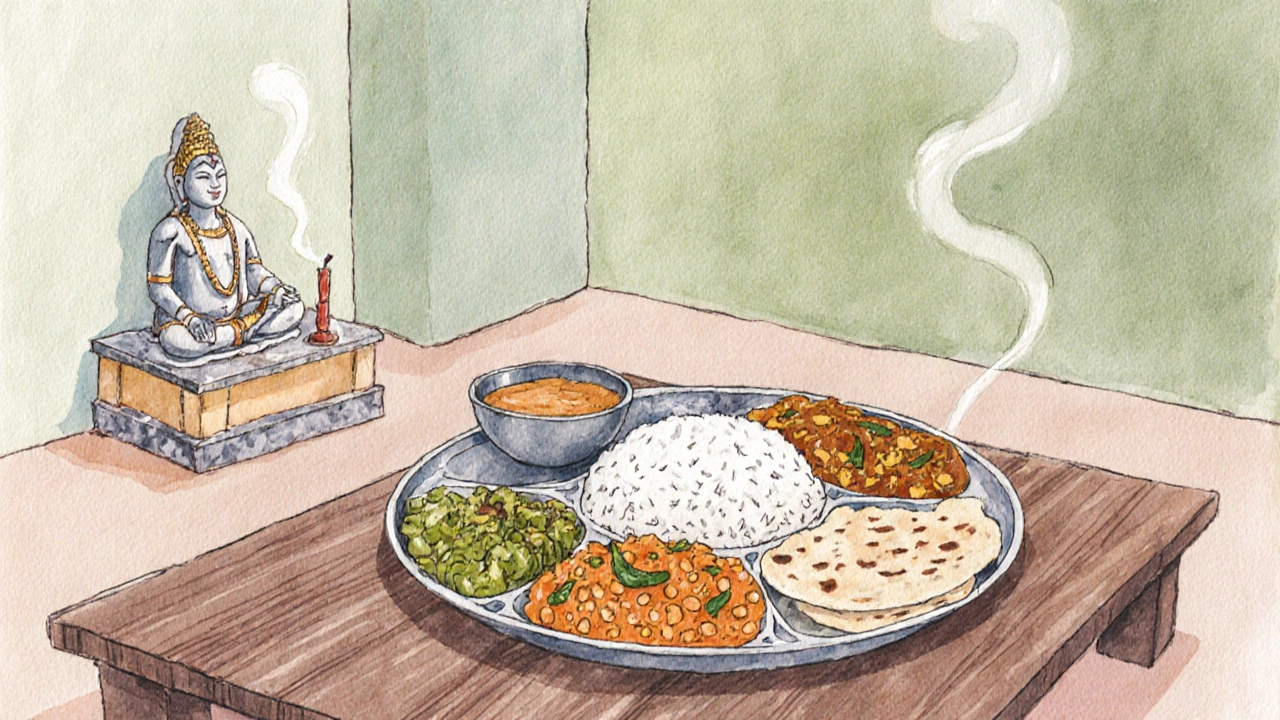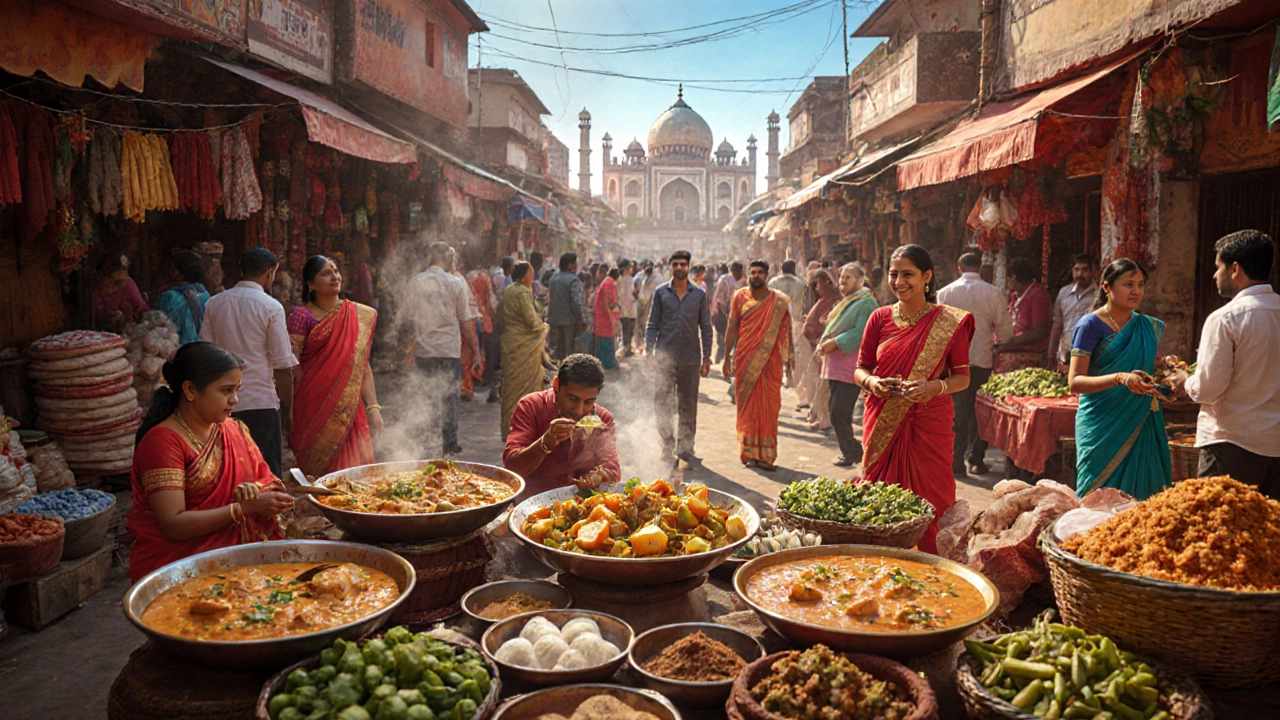21 Oct 2025
- 0 Comments
Indian Vegetarianism Calculator
Religious Vegetarianism Calculator
Select a religion to see its vegetarian percentage and key dietary practices.
Vegetarianism in
Key Dietary Rules
Typical Dishes
Ever wondered why a huge chunk of India’s population lives on plants? The answer isn’t just about flavor-it’s tied to religion, history, and daily life. Below we break down which faiths actually practice the most vegetarianism, why they do it, and what that looks like on the plate.
What vegetarianism in India really means
Vegetarianism in India is the cultural and religious practice of abstaining from meat, fish, and eggs, while often embracing dairy, legumes, and vegetables as staple foods. According to the 2023 National Sample Survey, about 30‑35% of Indians identify as strict vegetarians, a figure that jumps to 70‑80% in certain states like Gujarat and Rajasthan.
The numbers alone don’t tell the whole story. Different religions prescribe varying levels of restriction, and regional customs add another layer. Let’s explore each major faith.
Hinduism is the oldest and largest religion in India, encompassing a wide range of beliefs about life, reincarnation, and diet
Hindu scripture-especially the Vedas and later texts like the Mahabharata-encourages ahimsa (non‑violence) toward all living beings. While not every Hindu is strictly vegetarian, many follow a lacto‑vegetarian diet, especially in South India, Gujarat, and Maharashtra.
- Key belief: The cow is sacred, so beef is universally avoided.
- Typical dishes: Paneer tikka, aloo gobi, dal tadka, and idli‑sambar.
- Vegetarian share: Roughly 45‑50% of Hindus avoid meat altogether.
Festivals like Navratri and Janmashtami reinforce plant‑based feasting, and many households keep a separate kitchen for vegetarian meals.
Jainism is a religion that takes the principle of non‑violence to its strictest logical extreme, forbidding harm to even the smallest creature
Jains are the most disciplined eaters in India. Their diet excludes meat, fish, eggs, root vegetables (like onions and potatoes), and even honey because pulling a plant from the ground kills it.
- Key belief: Ahimsa is non‑negotiable; even micro‑organisms matter.
- Typical dishes: Jain thali (without root veg), dal, rice, and seasonal vegetables sautéed with mild spices.
- Vegetarian share: Near 100% of Jains are strict vegetarians. In fact, 95% of Indian vegetarians belong to the Jain community or follow Jain‑inspired practices.
Their strictness makes Jains a clear leader in vegetarian adherence.
Sikhism is a monotheistic faith founded in the 15th century, emphasizing equality, community service, and honest living
Sikh scriptures (Guru Granth Sahib) do not forbid meat, but they prohibit halal and kosher slaughter practices. The most famous Sikh dish, ‘langar’, is a communal kitchen serving simple, usually vegetarian meals like dal, roti, and sabzi, to ensure everyone-regardless of background-gets the same nourishment.
- Key belief: Food should be prepared with clean intent; halal meat is avoided.
- Typical dishes: Lentil soup (dal), whole‑wheat flatbread (roti), and mixed vegetable curries.
- Vegetarian share: About 20‑25% of Sikhs adopt a vegetarian diet, mostly in gurdwaras and among those who eat regularly at langar.

Buddhism is a philosophy and religion focusing on the Four Noble Truths, the Eightfold Path, and the principle of reducing suffering
Many Indian Buddhists follow a vegetarian diet, especially those belonging to the Mahayana tradition, which interprets ahimsa broadly. However, Theravada Buddhist communities in the Himalayas sometimes consume meat if it is offered without the intention of killing.
- Key belief: Reducing harm to sentient beings aligns with the goal of enlightenment.
- Typical dishes: Tofu‑based curries, vegetable biryani, and lentil soups.
- Vegetarian share: Approximately 60% of Indian Buddhists observe a plant‑based diet.
Islam is the second‑largest religion in India, with a diverse population following the Qur'an and Hadith
Islamic dietary law (halal) permits meat but forbids pork. While most Indian Muslims eat meat, there’s a growing trend of vegetarianism for health or ethical reasons, especially among urban youth.
- Key belief: Halal slaughter is required; no restriction on plant foods.
- Typical dishes: Vegetable biryani, paneer tikka (when served at mixed gatherings), and lentil dals.
- Vegetarian share: Roughly 5‑7% of Indian Muslims follow a vegetarian diet, often due to personal choice rather than religious mandate.
Christianity is a minority faith in India, comprising a mosaic of denominations that generally have no dietary restrictions
Most Indian Christians eat meat, but certain sects (like some Pentecostal groups) practice fasting periods that are vegetarian. The cultural influence of Western cuisine also introduces more meat‑centric meals.
- Key belief: No prescribed diet; personal or communal fasting determines food choices.
- Typical dishes: Vegetable pulao, coconut‑based curries, and bean stews.
- Vegetarian share: Around 3‑4% of Indian Christians identify as vegetarian.

Ayurveda is the ancient Indian system of medicine that links diet, lifestyle, and health
Ayurvedic principles heavily influence vegetarian cooking across religions. Foods are classified by taste (sweet, sour, salty, bitter, pungent, astringent) and by their effect on the three doshas (vata, pitta, kapha). A vegetarian diet is often recommended for balance, especially for those seeking spiritual clarity.
Quick comparison of Indian religions and vegetarianism
| Religion | Approx. % of adherents who are vegetarian | Core dietary rule | Typical vegetarian dishes |
|---|---|---|---|
| Jainism | ~95‑100% | Avoid all animal products and root vegetables | Jain thali, dal, rice, seasonal veg |
| Hinduism | 45‑50% | Ahimsa; beef forbidden | Paneer tikka, aloo gobi, idli‑sambar |
| Buddhism | ~60% | Minimize harm; many choose vegetarian | Tofu curry, vegetable biryani |
| Sikhism | 20‑25% | Halal meat avoided; langar is vegetarian | Dal, roti, mixed veg sabzi |
| Islam | 5‑7% | Halal meat allowed; no vegetarian rule | Veg biryani, paneer dishes |
| Christianity | 3‑4% | No dietary law; fasting optional | Veg pulao, coconut curry |
Why do these religions lean toward plants?
Three main forces drive the vegetarian trend across faiths:
- Spiritual doctrine: Ahimsa and karma encourage non‑violence.
- Health & longevity: Ayurvedic texts claim plant‑rich meals balance doshas and reduce disease. Modern studies back this-vegetarian Indians have lower rates of heart disease than meat‑eaters.
- Economic & regional factors: In arid zones, raising cattle is costly, making grain‑based meals more practical.
All three overlap, especially in rural settings where religion, health wisdom, and affordability meet at the kitchen table.
Living the vegetarian life in modern India
If you’re curious about trying a plant‑based Indian diet, here’s a quick starter checklist:
- Stock basic pulses: red lentils (masoor), split peas (toor), and chickpeas.
- Keep staple grains: basmati rice, whole‑wheat flour (atta), and millet.
- Use spices mindfully-turmeric, cumin, coriander, and mustard seeds give flavor without meat.
- Explore regional specialties: Gujarati dhokla, South Indian dosa, Rajasthani gatte ki sabzi.
- Respect fasting periods: many festivals (e.g., Navratri) have strict vegetarian rules-great opportunities to experiment.
Whether you follow a faith or simply love the tastes, the Indian vegetarian tradition offers something for every palate.
Which Indian religion has the highest percentage of vegetarians?
Jainism tops the list, with nearly all Jains-about 95‑100%-practicing strict vegetarianism, often avoiding even root vegetables.
Do most Hindus eat meat?
Around half of Hindus are lacto‑vegetarian, especially in the north and west. The rest consume meat, usually chicken or fish, but avoid beef.
Is Sikhism a vegetarian religion?
Sikhs are not required to be vegetarian, but the communal langar kitchen serves only vegetarian meals to ensure inclusivity.
How does Ayurveda influence Indian vegetarian cooking?
Ayurveda categorizes foods by taste and effect on the body’s doshas, promoting a balanced mix of grains, legumes, and vegetables-often without meat.
Can Muslims or Christians be vegetarian in India?
Yes. While their religions don’t prescribe vegetarianism, a small but growing number of Indian Muslims (5‑7%) and Christians (3‑4%) choose plant‑based diets for health or ethical reasons.
